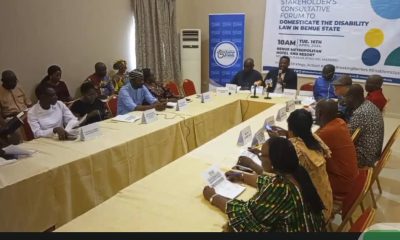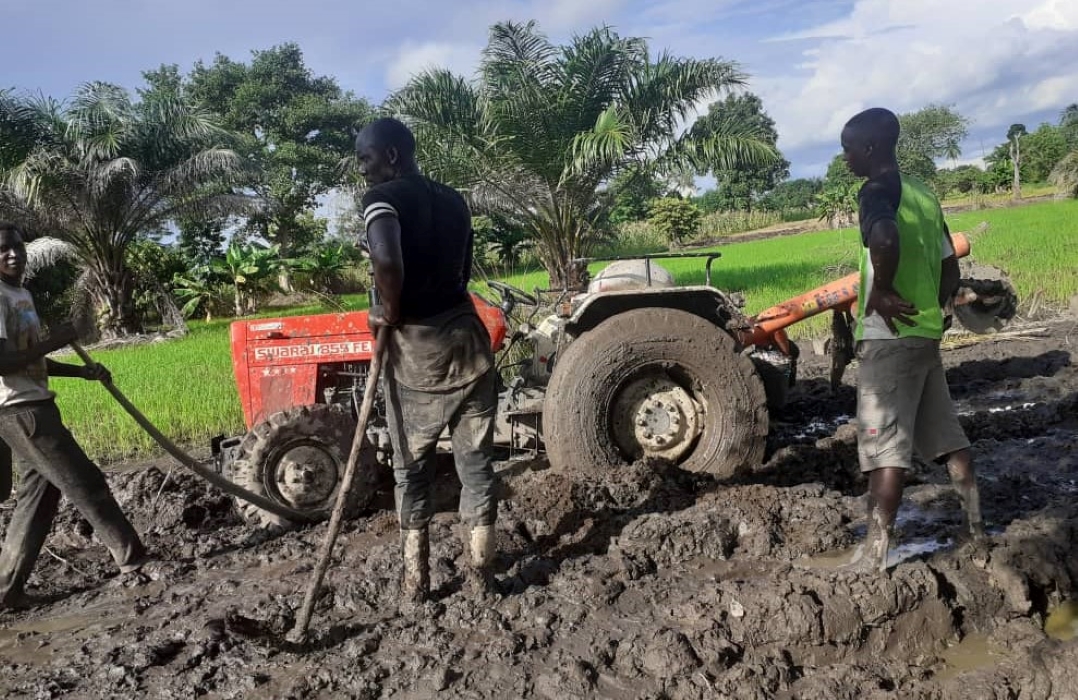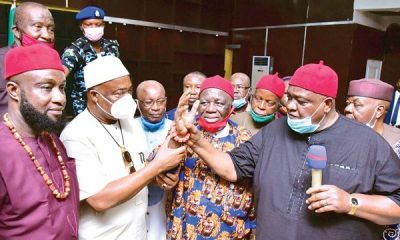OPINION
2023 and Southeast Presidency: Quislings Beware!
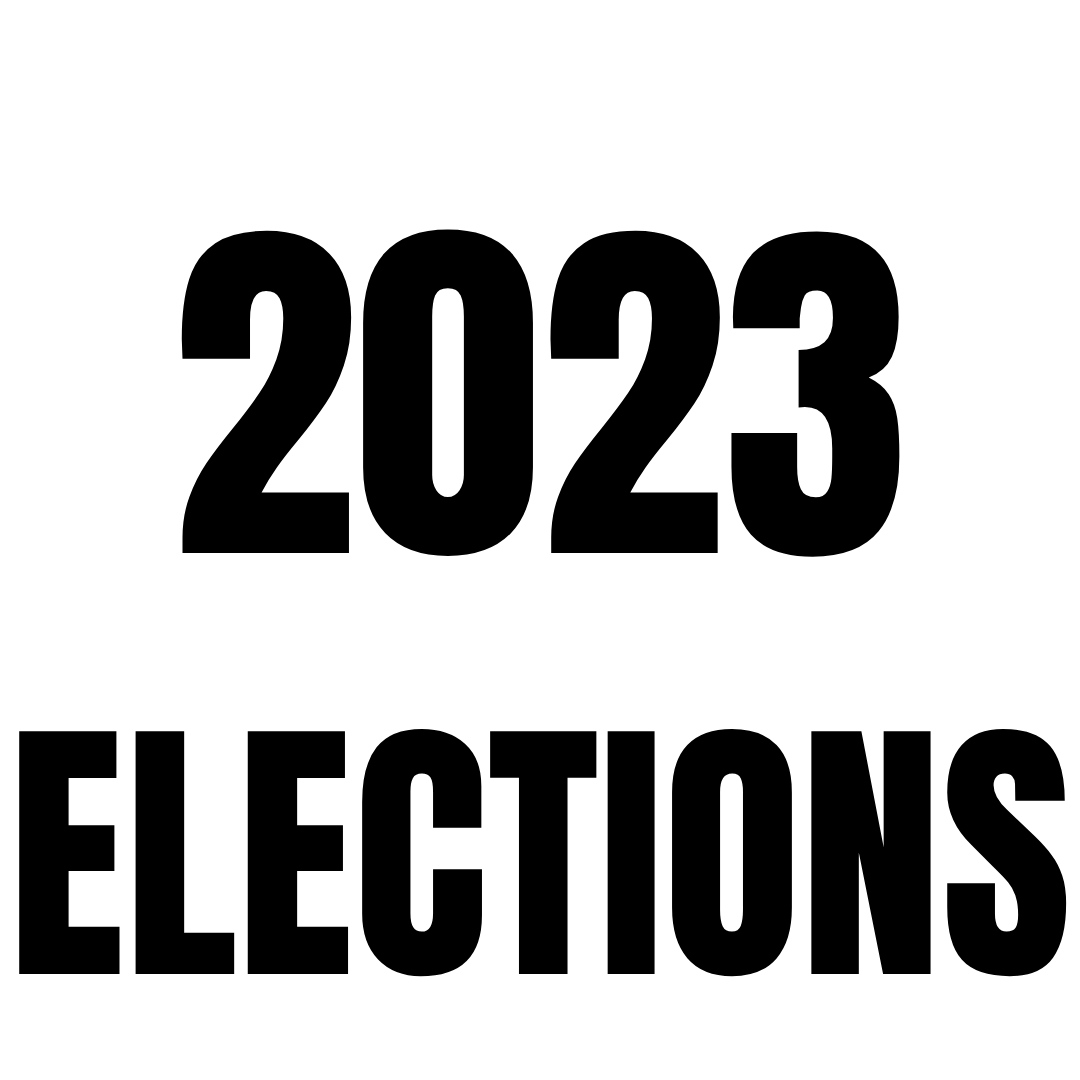
By Ikechukwu Amaechi
This is an election season like no other. Everything is defying logic. For instance, how does one explain the fact that when the All Progressives Congress, APC, decided to sell its presidential nomination form at a whopping N100 million, an amount so outrageous in an economy where the minimum wage is N30,000, and many thought the only reason for the ridiculous hike was to scare aware “unserious” aspirants, that was when every Tom, Dick and Harry, joined the fray.
With the latest declarations on Wednesday of Senator Godswill Akpabio, Minister of Niger Delta, in Akwa Ibom, and Dr Kayode Fayemi, Governor of Ekiti State, in Abuja, there are now at least 14 aspirants jostling for the APC ticket.
That number includes Vice President Yemi Osinbajo, former Lagos State Governor, Bola Tinubu; Ebonyi State Governor, Dave Umahi; Kogi State Governor, Yahaya Bello; Cross River State Governor, Ben Ayade, Minister of Transportation, Rotimi Amaechi; Minister of Labour and Employment, Chris Ngige; former Imo State Governor, Senator Rochas Okorocha; former Abia State Governor, Senator Orji Uzor Kalu (who claimed he is withdrawing from the race because the position was not zoned to the Southeast); former Ogun State Governor, Senator Ibikunle Amosun; Minister of State for Education, Emeka Nwajiuba; former Edo State Governor, Adams Oshiomhole; and still counting.
The PDP is no less crowded with 17 aspirants who picked the party’s nomination forms at the equally whopping sum of N40 million.
The question that is concentrating on the minds of many is this: how is it that an outrageous fee which ought to scare aware faint-hearted politicians is doing the exact opposite – attracting them in their numbers?
Is there anything they know that the rest of us do not know? Granted, Nigerian politicians are incurable optimists and inveterate gamblers, but N100 million is still a tidy sum. So, why are they throwing that kind of money away without caring a hoot? Is it a bargaining chip, an inducement that can be used in negotiating for a piece of the pie at the end of the day?
Or could it just be, as some people have reasoned, that Buhari having lowered the leadership bar so ridiculously (some insist that the bar has been completely thrown away under his watch), everyone is emboldened to join the race knowing that no one can actually beat the Katsina scion’s record? But for me, the 2023 election raises a bigger and more fundamental issue. I am hopeful even as I despair.
I am hopeful because for the first time in decades, men of a good conscience, having realised the injustice meted out to Ndigbo are calling for equity, justice and fairness despite the pushback from those whose sense of entitlement has blurred the vision for a greater Nigeria. It gladdens the heart that Nigeria is not a lost cause when nonagenarians, men and women who have seen it all, are still standing by the barricades, and pointing out, most unequivocally that for inclusiveness and to heal the wounds of the past, Southeast geopolitical zone must be allowed to produce the president in 2023.
As I pointed out here last week, it is gratifying that a 94-year-old Chief Ayo Adebanjo, is shouting from the rooftop that Ndigbo must be allowed to ascend the presidential throne. What is even more gratifying is altruism. Chief Adebanjo stands to gain nothing personal for his advocacy other than the urgent desire to enthrone a Nigeria that can still work in his lifetime.
In his interview with TheNiche in February, Pa Adebanjo said: “It is your generation that I am pitying. At 94, what I am expecting now is my funeral dirge. Baba rele! That is the song they sing for the old man they are going to bury …. When the thing happens, I would have been in my grave. I will be enjoying myself there. You will be alive and you will say that man said it and I thought he was talking nonsense.”
The same goes for Pa Edwin Clark, who will soon be 95 years. And the good thing is that they are not even doing the battle alone. They are speaking on behalf of their socio-cultural organisations and the people they lead. Middle Belt leaders are in the same boat. Dr Pogu Bitrus, President of the Middle Belt Forum and his people are relentless in their demand that the time for a Nigerian President of Southeast extraction is now.
This week, former Senate Leader, Senator Ali Ndume, a member of the APC from Borno State, cautioned the leadership of his party and fellow Northerners that it will be unfair and a betrayal of trust if the APC zones the presidency to the North. But it is disheartening that at a time other Nigerians have agreed that to continue excluding Ndigbo from the leadership table will be ruinous, some Igbo leaders motivated solely by filthy lucre are the ones saying zoning does not matter. They are amplifying, acting as an echo chamber of those who disingenuously say zoning does not matter anymore.
I am worried about the antics of these Igbo quislings – that is what they are – who are working actively to stymie the quest for a Nigerian president of Southeast extraction. Last week, Ralph Uwazuruike, leader of the Movement for the Actualisation of the Sovereign State of Biafra, MASSOB, a man who led so many impressionable Igbo youths to their early graves in the name of Biafra, turned full circle when he publicly pooh-poohed the idea of an Igbo man succeeding Buhari.
Because that idea has suddenly become anathema to him, Uwazuruike said the 2023 presidential contest should be thrown open to all Nigerians. And guess who he is rooting for? Yahaya Bello, Governor of Kogi State. Uwazuruike, who admonished Nigerians to shun zoning, insisting it has no place in the Constitution of the Federal Republic of Nigeria, said he was supporting Bello because he is the best man for the job.
Really? Thousands of Igbo youths will be turning in their graves. Only if they knew! There is also Prof. Udenta Udenta, spokesperson for the Bala Mohammed Campaign Organisation. Bala, Governor of Bauchi State, is a Fulani irredentist, who has publicly supported marauding undocumented Fulani terrorists in their quest for territorial conquest. If he is making such advocacy now, what more if he becomes president. He will be worse than Buhari. That is the man Udenta is marketing.
But the worst of the pack are the two Southeast PDP governors – Dr. Okezie Ikpeazu (Abia State) and Ifeanyi Ugwuanyi (Enugu), who are campaigning for Nyesom Wike, Governor of Rivers State, a man who has nothing but absolute contempt for Ndigbo. Both governors ignored the array of aspirants from the Southeast to endorse Wike as the presidential candidate of the PDP.
This is the stuff quislings are made of. They betray the collective will of their people when it matters most. The good thing, though, is that history never forgets the role played by traitors who collaborate with an enemy force. A lot of reasons have been advanced by these quislings as to why they would rather support a back to back Fulani presidency than advance the cause of a more equitable society.
They say the “North” had agreed not to relinquish power in 2023 and there is nothing anyone can do. I don’t know which North they are talking about and even if there is still a monolithic North, whether they alone can elect a president. In any case, the votes in the North include those of southerners who live there.
Buhari tried for 12 years with his much-vaunted 12 million votes and failed until he got the buy-in of the South. Today, Atiku Abubakar is talking about a guy with 11 million votes that should be given a right of first refusal. But he was being smart by half when he refused to acknowledge that the bulk of the 11 million votes came from the South, mostly Southeast and South-South. If he insists on running in 2023 and succeeds in muscling out the South in the primaries, those 11 million votes may no longer be there for him.
But assuming without conceding that the North has so cooked up the voting figures that there is nothing anyone can do, that should still be no comfort to the quislings. Why? As Jesus Christ told His disciples: “The Son of Man will go just as it is written about him. But woe to that man who betrays the Son of Man! It would be better for him if he had not been born.”
(Mark 14:21). Even if the quest for a Nigerian President of Igbo extraction is a lost cause, and it is not, it should never be said that the traitors were Igbos because history will remember and the judgement will be harsh.
Amaechi is a Lagos-based journalist
OPINION
Ending the Menace of Oil Theft in Niger Delta

By Braeyi Ekiye
Standing up for justice and vocally too, is about standing up for each other. It is our duty to speak for the nation’s lingering ills to be corrected, particularly when others cannot speak up. That is the critical power of the voice for the reconstruction of the Nigerian State to attain the desired real nationhood.
Former governor and now a senator representing Bayelsa West, Seriake Dickson recently stood up to be counted on a serious national issue; oil theft and its debilitating consequences on Nigeria’s economy and security.
Answering questions on a programme at Channels Television recently, Dickson pointedly accused some very important personalities from Lagos and the Federal Capital Territory, Abuja for being behind oil theft in the Niger Delta.
Hear the Senator:” The Official system and oil companies are beneficiaries of oil theft in the Niger Delta”. Dickson bemoaned the absence of national values which he said, makes people to use the nation’s resources for selfish gains.
“People from Abuja and Lagos are the masterminds and the official system is not ignorant and not innocent. The official security system, the official oil system, the official federal system, all of it in its entirety. It’s a powerful system,” he stated.
Dickson wondered why a country like Nigeria that has been producing oil, exporting oil for the past 70 years was unable to have scientific way of metering, recording what leaves, what is pumped, what is sold and what is not sold? He concluded that it was a deliberate attempt at bleeding the country of her financial and economic wealth through illegal bunkering, superintended by local, national and international oil theft collaborators.
It is instructive that the Nigeria Extractive Industries Transparency Initiative (NEITI), had in November 6, 2023, through its Executive Secretary, Ogbonnaya Orji, said that oil theft was an emergency that posed serious threat to oil exploration and exploitation with huge negative consequences on economic growth, business projects and profit earnings by oil companies.
Orji stated that as a result of NEITI being a member of the “Special Investigative Panel on Oil Theft and Losses”, the organisation was aware that: “Oil theft is perpetrated mainly through pipeline clamping, illegal connections and major pipeline exploitation of abandoned oil well heads, pipeline breakages and vandalism of key national assets to illegally siphon crude into waiting vessels stationed in strategic terminals”.
NEITI maintained that it was a matter of fact that many members of the pipeline’s association were directly and indirectly involved in providing the skills and knowledge required to carry out oil theft.
Orji therefore, condemned the association for failing to put in place stringent regulations and appropriate sanctions to check involvement of their members.
While being hopeful that President Bola Tinubu’s leadership would spring a surprise to douse the fears, the apprehensions of critical Nigerian minds, like Senator Dickson, Ogbonnaya and many others, there is the compelling need for this administration to seriously interrogate this malignant ulcer on the nation’s oil industry. There is also the need to critically examine NEITI’s unsolicited solutions to the problems of oil theft that have held Nigeria’s economy prostrate and her developmental framework for accelerated growth in all facets stunted.
NEITI in a report titled: “Nigeria’s Battle With Crude Oil Theft: A Total of 4,145 Cases Since May 2023,” published by Arise News on November 23, 2023, revealed a staggering number of highlights of the severity of the issue at hand.
Also, in its weekly: “Energy & You” series aired on the NTA News Network, the NNPCL noted in Episode 7 that 344 crude oil theft incidents were recorded between January and April 2023. Meanwhile, by Episode 8 of the weekly NTA television series, NNPCL shared reports of crude oil theft incidents. A summation of crude oil theft incidents recorded between episode 8 (May 2023) and episode 30 (October 2023), revealed that a total of 4,145 crude oil theft incidents were recorded between May 2023 and the second week of October 2023.
According to NNPCL records, some of the more active hotspots for crude oil theft in the Niger Delta include; Ohaji-Egbema, Oguta (Imo), Ogbia, Imiringi (Bayelsa), Obodo-Omadino, Ughelli (Delta), and Egorobiri creek, Gokana, Iba community, Emuoha, Rumuji, Degema (Rivers).
Nuhu Ribadu, the National Security Adviser, had revealed in August 2023, that: “the country was losing 400,000 barrels of oil per day to crude oil thieves”. This led to commentators insisting that the persistence of crude oil theft in Nigeria lays bare the deep-rooted issues of corruption and severity of vulnerabilities in the country.
That, Nigeria lost more than ₦4.3 trillion naira to oil theft in five years, stolen in 7,143 pipeline vandalism cases is not news. NEITI had revealed this startling loss at the Nigeria Interventional Security Conference in Abuja, with the theme: “Bolstering Regulations, Technology and Security for Growth”, way back in November 2023. The conference was organised by the Pipeline Professionals Association of Nigeria. In a presentation at the conference, NEITI, the federal government agency, revealed that oil theft and losses in Nigeria have become a national emergency, and shall I say, a monumental embarrassment to the country.
Recently, Senator Munir Nwoko, representing Aniocha/Oshimili Senatorial Constituency shed more light on this disturbing matter. Nwoko said that certain security officials whose primary duty is to safeguard oil and gas assets, are actually complicit in this illegal trade. “They are driven by the financial gains associated with illegal activities”, the distinguished senator said.
The crude oil theft network encompasses a broad spectrum of individuals and groups as Senator Dickson rightly pointed out at the Channels TV interview and corroborated by NEITI. It involves foreign oil traders, shippers, bankers, refiners, top-ranking politicians and even military officials.
Providing data from the agency’s reports to back his claims, NEITI’s Orji, said: “NEITI in the last five years, 2017-2021, has found that Nigeria recorded 7,143 cases of pipeline breakages and deliberate pipeline vandalism resulting in crude theft and product losses of 208.639 million barrels valued at $12.74m or N4.325 trillion. NEITI reports also disclosed that during the same period, Nigeria spent ₦471.493 billion to either through repairs or maintenance of pipelines.
The criminal exploits, NEITI said, takes place, ‘most times in atmosphere of communities’ complicity and conspiracy of silence. This, therefore, calls for the Tinubu administration to swiftly swing into action to put an end to this dastardly act, or at least, reduce it to the barest minimum. After all, the state security agencies for effecting a quick resolution of this matter are at the president’s beck and call.
It would also be recalled that NEITI released empirical data of oil theft and losses way back 2009 and 2020 to the staggering figure of 619.7 million barrels of crude, valued at $46.16 billion or ₦16.25 trillion. In addition, Nigeria lost 4.2 billion litres of petroleum products from refineries, valued at $1.84 billion at the rate of 140, 000 barrels per day, from 2009 to 2018. Thus, the total value of crude losses between 2009 and 2020 is higher than the size of the country’s reserves and almost 10 times Nigeria’s oil savings in Excess Crude Account, NEITI said.
So, how long shall Nigeria continue to condone these criminal activities? The country’s inability to proffer answers to these questions will continue to keep Nigeria in a state of coma in her overall developmental strides, including her peace, unity and security.
Ekiye writes from Yenagoa, Bayelsa State.
OPINION
NIN-SIM Linkage and the Nigeria We Desire
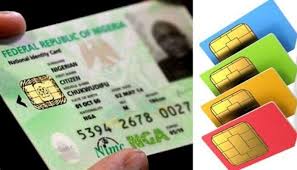
By Tunde Akanni
Rights and responsibilities are the twin words that best describe the inception and the increasing impact of digital technology, a major strand of which is the dynamic contemporary telecommunication services. Even before the imminent(?) internet of things (IOT), a lot is playing out for human civilisational process throwing up existential challenges for citizens and duly requiring governmental interventions to cope with.
If only to safeguard innocent citizens from the antics of criminals, government is often quick at fashioning laws and penalties for violations.
The most far reaching legal intervention in this context is the Cybercrimes Prohibitions Act of 2015 with its most significant component being the Cybercrime Advisory Council. Incidentally, this Council is considered rather exclusionary by media and allied rights advocates.The said deficit of the Cybercrime Advisory Council is a pointer to the fact that in climes such as ours, not much attention is often given by government to social needs, specifically in this case, Media and Information Literacy, MIL, already over hyped by the informed stakeholders. Unfortunately, some undiscerning members of the society keep falling falling victim of related laws.
Please follow this pathetic story, the audio of which I keep till date: Muhammad is a private school principal at Nyanya, an Abuja, suburb. As a side hustle, he runs a Point of Service (POS) business for payment. Then came a criminal one day who had just robbed and killed his victim. Using his victim’s card, he requested two transfers of N500,000 each.
The criminal made several other purchases and also went to some other operators of POS. Eventually he was found out and law enforcers had to track all transactions he had carried out with the victim’s card. Muhammad of Nyanya thus became a suspect and was promptly arrested. Thus began endless investigations… Muhammed ended up being detained for months in a prison.
You can imagine the psychological torture not only for Muhammad but his immediate family, employers and others who love him. He learnt his lesson in the bitterest way yet his ordeals could have been averted by sufficient exposure to basics of MIL. But life goes on. Indeed, it must be business as usual
Otherwise how do we explain the cacophony playing out after the expiration of the deadline of 29 March for NIN-SIM linkage? The Nigerian Communications Commission (NCC) has confirmed that it would not be reviewing its deadline to bar owners of more than four SIM cards whose SIM registration data failed to match their National Identity Number (NIN) data.
The Commission explained that its position was hinged on its objective to clean the country’s SIM ownership database, and ensure that criminals could not take advantage of having multiple unlinked SIMs to carry out their nefarious activities. The Commission’s resolve is hinged on the need to close in on the chaos of untoward ownership of multiple SIM cards with unverified NIN details. According to the Commission “we have instances where a single individual has over 10,000 lines linked to his NIN. In some cases, we have seen a single person with 1,000 lines, some 3,000 plus lines. What are they doing with these lines?
The NCC has also provided Mobile Network Operators (MNOs) an extension till 31 July within which they are expected to verify all NINs submitted by subscribers with four or less SIMs, as well as bar those whose NIN fail verification with NIMC.
The Chairman of Association of Licensed Telecommunication Operators, Gbenga Adebayo, further confirmed that members of his association would comply.
However, just the next day or so after the deadline expired, yours sincerely sighted no fewer than three reports announcing the extension of the deadline, one of them stating specifically to 31 July, referring to some reliable inside source.
What’s all the fuss about really? This NIN-SIM linkage is a simple exercise that only requires a subscriber to submit his or her NIN to the service provider to enable the service provider match details of the subscriber taken at the time of initial SIM registration process. This could be done through assorted windows including physically by visiting designated points. For techno-literate persons, they are merely expected to use short, universal codes for both submission and retrieval for those who may want to verify their own compliance as the media kept repeating deadlines.
The reality today is that barely literate persons and even illiterates now use telephones given its increasing centrality to a lot of human activities. This is the basis of this writer’s advocacy for an earlier generalist nomenclatural label suggestion of “Digital Culture” in place of “Digital Economy” preferred by Minister Ali Pantami when he chose to rename the ministry he was asked to superintend over (https://www.thecable.ng/digital-culture-or-digital-economy)
Telecommunication industry players have been unequivocal about the key benefit of NIN-SIM linkage being the protection of subscribers and prevention of crimes such as exemplified above. For instance, on account of the huge amount involved, the POS operators may have documented details of whatever identity provided by the criminal. As a matter of fact, the truth may have been readily revealed in the course of such documentation. But the information literacy knowledge could only have been deployed based on certain pre-existing conditions such as NIN-SIM linkage offers an example.
Still on crime, another major advantage that may derive from the NIN-SIM linkage is the ease with which law enforcers may trace and tackle criminals through their registered lines. Afterall, no one may be allowed to own any line except you are ready to play by the set rules.
Furthermore, this linkage thing will automatically ease economic transactions electronically since identities will be easily verifiable for concerned parties such as it pans out with regards to debit cards and similar devices. NIN-SIM linkage is therefore the way to go and the exercise has to run with a good measure of discipline especially with existing spectacular anomalies of thousands SIMs connected to some individual.
At this stage, the campaigns executed so far need be audited to make for genuine inclusivity with regards to social, geographical and other possible lines. For instance, this task now requires a well designed stakeholder mapping. The mapping must ultimately reveal spots of irregularities and areas as well as interests deserving more attention.
Given that all media genres had been previously deployed perhaps for conventional announcements, how about aligning subsequent dissemination more enriched via regular media contents? How about being more scientific, relativizing media use depending on audience preference and possible perception? In reality this could translate to devolving dissemination more to the grassroots by enlisting the emerging broadcasters namely, community broadcasters and campus broadcasters.
Beyond liberalising the media to be used, campaigns must also be made to align with credible programmes with obvious trendy touch of management such as may ensure their global reach and enduring availability as may be made possible by platforms like Youtube and Spotify.
With affiliation to champions of multi-stakeholder philosophy like the UN’s annual Internet Governance Forum, IGF, for the management of telecommunication facilities, need NCC be reminded of the importance of democratised governance culture?
It is most certain that the involvement of the relatively cheaper (not necessarily technologically inferior) community and campus broadcasters will help to boost the NIN-SIM linkage campaigns and indeed others that may arise in future.
It will as not be out of place for NCC to support the campaigns for the popularization of Media and Information Literacy. This certainly will help to resolve a lot of digital divide inspired issues
With the concern demonstrated on this exercise so far, NCC has demonstrated that it now has an improved corporate governance culture as advocated by IGF (https://punchng.com/nigerias-communication-governance-indifference/ ). It can however do better and even excel.
Akanni is an associate professor of media and development at the Lagos State University. Follow him on X via @AkintundeAkanni
OPINION
The Lessons of Okuama Tragedy
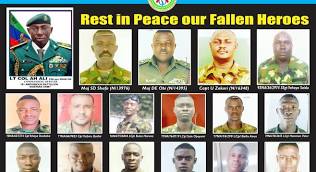
By Michael Owhoko
Has Nigeria learnt any lessons from the Okuama massacre? Will the incident repeat itself or offer profound lessons against a future experience? In the journey of life, no individual or nation or country is immune from occurrences thrown up by circumstance, which may be pleasant or painful.
Lessons from such experiences are deployed to prevent possible future reoccurrence, failing which the same catastrophe would repeat itself.In context, the gruesome murder of army officers at Okuama in Ughelli South Local Government Area of Delta State, which transcends ethnic emotions and was accompanied by wide condemnations, is a confirmation that Nigeria has not, and does not learn from lessons, otherwise the calamity would have been avoided.
The incident was not the first of its type. It had happened previously at Odi, Bayelsa State; Zaki Biam, Benue State; and Gbaramatu, Delta State, yet it appeared that neither the Federal Government nor the Nigerian Army learnt any lessons from the earlier occurrences. This is evident from the Okuama saga, a proof of the country’s insensitivity to bloodshed and exposition of poverty in the policy making process.
This notwithstanding, the Okuama calamity has again thrown up another opportunity for lessons to be learnt. If Nigeria fails again, this time around, to learn from these happenings, then the country risks further carnage, which may possibly take a more complex form, with unmanageable and unpredictable consequences. It may be too costly for the country’s fledgling socio-economic balance and stability.
Therefore, the lessons are crucial and should be identified by government, to be harnessed as feedback for proactive purposes, to forestall future recurrence. It is a tragedy for any country with a relapsing experience, not to have a codified strategy encapsulated in a template to resolve related matters. In specific terms, what then are the lessons and takeaways from the Okuama disaster?
Lesson One: To have allowed a land dispute over fishing rights between Okuama and neighbouring Okoloba communities in Bomadi Local Government Area, Delta State, to escalate means there were no proactive measures and prompt concerted interventions by the Nigeria Police Force and Delta State Government, in response to petitions written by the Okuama community.
The community, through its lawyers, I. Ejedegba and Co., had written a petition to the Commissioner of Police in Asaba, Delta State, which was acknowledged on 31 January, while that written by the community’s leaders to the Delta State Governor was received on 2 February. This was over one month before the gruesome murder of the military officers on 14 March.
Since the Police is the first line of contact and statutorily responsible for civil security matters, they should have waded in upon receipt of the petition, to nip the crisis in the bud, aside the previous joint meetings held among the communities, the Police and the Delta State Government that yielded no solution. Under this development, the Delta State Governor should have been advised to wield the big stick by acquiring the land in contention for public interest, to end the crisis.
Lesson Two: Inviting the Army for a mediatory and peace mission to Okuama for the resolution of a land dispute between two communities that were not at war, was an error in judgement. The dispute was civil in nature, and it was only when the efforts by the Police and the Delta State Governor had failed, and there was evidence of likely escalation into a dangerous dimension beyond the capacity of the Police, that would have warranted the intervention of the Nigerian Army. It is not the responsibility of the Army to broker peace in a civil matter.
Lesson Three: Central to the killing of the military personnel in Okuama is presumably oil. Oil appeared to be the underpinning motive behind the horrendous and senseless killings. Mere land dispute between two communities could not have led to such a mindless massacre. Soldiers are deployed to the Niger Delta region to protect oil facilities, and in the course of this duty, they might have been marked as “enemy” by those profiteering from illegal oil deals.
Those involved in crude oil theft and other illegal activities, including the processing of locally refined products, might see the Army as an obstacle to their business interests. The military high command should have known this, and prepared the soldiers for any possible eventuality and collision with entrenched oil thieves.
The circumstances of their deaths showed that the military men were taken unawares. It was likely that crude oil thieves and other vested interests might have planned and taken advantage of the soldiers’ peaceful disposition to unleash mayhem on them in such a horrific and despicable manner.
Lesson Four: The mass destruction of Okuama by the Army in response to the death of the soldiers, without singling out the culprits, was unhelpful, as innocent children, mothers, the elderly, the sick and even pregnant women, were either killed, rendered homeless or died while trying to escape.
To bring pain on an entire community over the action of a few criminals, is indefensible. Reprisal attacks and collective punishments are incompatible with international law.
It should be recalled that after the destruction of Odi by the Army, the community resorted to litigation and got a favourable judgement, leading to the payment of a N15 billion out-of-court settlement as compensation. Justice Lambi Akanbi of the Federal High Court had condemned the government for a “brazen violation of the fundamental human rights of the victims to movement, life and to own property and live peacefully in their ancestral home.”
Since the Okuama experience is reminiscent of the destruction in Odi, it is likely Okuama may seek redress in the law court for compensation over the reprisal destruction of lives and properties.
Lesson Five: As the President and Commander-in-Chief of the Armed Forces of Nigeria, Bola Tinubu’s order to the Army was too hasty and reactionary, without taking into consideration innocent lives in Okuama that were caught up in the web. Granting “full authority” to the military to bring anybody found to have been responsible for the attack to justice was an obvious blanket licence for the military to invade Okuama.
Instead, the President should have ordered the security agencies and the Police to specifically intervene, identify and arrest the criminal elements in the community, while instituting an independent high-powered panel of enquiry to unravel the causes of the mayhem. A future restraint on the part of the President is imperative to douse tension and minimise further collateral damage.
Lesson Six: The Army’s decision to lock down and lay siege to Okuama without granting access to the Delta State Governor, the Police, humanitarian agencies, and even the press to assess the situation on ground, has given rise to speculations about the plight of the members of the community, particularly the innocent, helpless and indigent persons. This is unhelpful to the image of the Army.
By not allowing access, the Army has unwittingly opened its operations to speculations. For example, it was alleged that the Army killed over 5O persons in Okuama, with other survivors hiding in the bush, including old women, children, the elderly ones and even the sick, with no food to eat or water to drink. This is a gross violation of their fundamental human rights.
To avoid being put on the spotlight, it is imperative for the military to grant access into the community to enable humanitarian agencies and volunteer groups extend help and assistance to the innocent ones, to prevent further fatalities. This will also serve the interest of the Army’s reputation.
Lesson Seven: After the destruction of Odi, initial public sympathy for the military waned. The same is replicating itself in Okuama over the conduct of the Army. The Army, like other Federal Government agencies, is not a supreme institution that is above the Constitution and the Nigerian State, neither is civilian population subject to military laws.
Indeed, the Army is subject to civil authority under a democracy. Therefore, it must change its current tactics at Okuama, where it has refused access to the community, assumed being the sole information provider on goings-on, and subjected civilians to investigation, arrest and detention.
It is hoped that these lessons will serve as reference and guide for the state governments, the Police, the Army and the federal government in the handling of related crises to avert future disasters.
Owhoko, a Lagos-based public policy analyst, author, and journalist, can be reached at www.mikeowhoko.com, and followed on X (formerly Twitter) @michaelowhoko.


